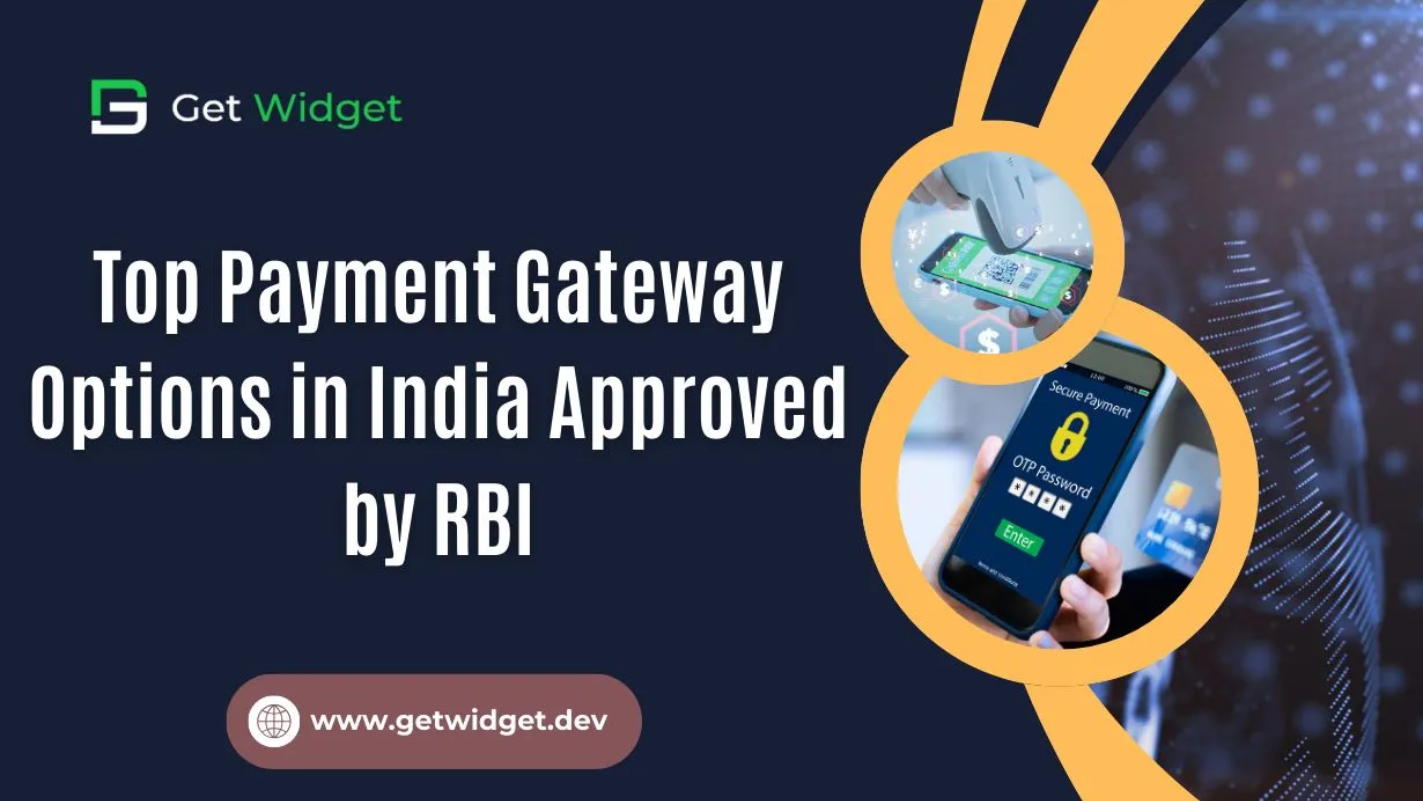With India embracing digital transformation at an unprecedented pace, businesses of all sizes—from local startups to large-scale e-commerce brands—are seeking reliable, secure, and RBI-approved payment gateway services. The right payment gateway doesn’t just facilitate transactions; it ensures regulatory compliance, customer trust, fraud protection, and ease of use.
This guide provides an in-depth look at the top payment gateway options in India approved by RBI that align with current regulatory standards and customer expectations. Whether you’re looking for multi-currency support, UPI integration, or instant settlements, these gateways cover the spectrum of needs for the modern Indian merchant.
Understanding RBI-Approved Gateways
Before diving into the top providers, it’s crucial to understand what it means for a payment gateway to be RBI-approved. The Reserve Bank of India regulates digital payment providers to ensure they meet financial, technical, and security norms. Gateways that align with the Payment Gateway Compliance India regulations must implement strong encryption, tokenization, and risk management frameworks.
Under the Payment Aggregator RBI Guidelines, all gateways and aggregators must obtain formal approval to operate. These rules protect consumers, prevent fraud, and strengthen India’s digital economy. By choosing a gateway that meets the Payment Gateway Approval Process RBI, merchants can be confident about legal compliance and operational security.
Top 10 RBI Approved Payment Gateways in India
1. Paytm Payment Gateway
Paytm Payment Gateway is one of India’s most recognized digital platforms. Known for its scalability and developer-friendly tools, it supports a wide variety of payment methods including cards, UPI, net banking, and wallets.
It is especially popular among retailers and D2C brands for its user-friendly dashboard and analytics. Paytm’s alignment with data security standards and real-time reporting tools places it among the leading names in the Digital Payment Gateway India space. With seamless mobile SDKs and merchant-centric features, Paytm is an excellent fit for high-volume businesses.
2. Razorpay
Razorpay has established itself as one of the most innovative and tech-forward gateways in the country. Trusted by over 10 lakh businesses, it supports over 100 payment methods and offers automated settlements, smart analytics, and subscription billing features.
Its reputation as the Best Payment Gateway in India is well-deserved thanks to its robust fraud detection capabilities and easy integration for websites, apps, and ERP systems. Razorpay also provides financing solutions, making it more than just a payment gateway—it’s a complete business toolkit.
3. CCAvenue
A stalwart in India’s payment industry, CCAvenue has remained relevant with its evolving technology and extensive feature set. It offers multilingual checkout, invoice generation, and seamless plug-ins for all major platforms including Shopify, WooCommerce, and Magento.
What makes it unique is its role as a Multi-Currency Payment Gateway India provider. With support for over 200 international currencies and real-time FX conversions, CCAvenue is an excellent choice for global-facing businesses.
4. Instamojo
For small businesses and individual sellers, Instamojo is a practical, low-barrier solution. It simplifies the payment process with payment links, smart forms, and a user-friendly dashboard that can be set up in minutes.
It’s particularly attractive as a Payment Gateway for Small Business because there are no setup costs or complex verification procedures. Freelancers, NGOs, and home-based entrepreneurs can quickly start accepting payments with minimal documentation.
5. Citrus Pay
Now merged with PayU, Citrus Pay continues to offer powerful security-first payment solutions. It was among the early gateways to introduce PCI-DSS compliance and tokenization, making it a pioneer in safe digital transactions.
Recognized for its fraud monitoring tools and encrypted storage, Citrus Pay exemplifies a Secure Payment Gateway India. It supports smooth checkout experiences across mobile, web, and app platforms, meeting the expectations of modern digital consumers.
6. BillDesk
As one of the oldest and most trusted names in Indian payments, BillDesk has powered countless transactions for banks, insurance companies, and government portals. It’s well-known for its ability to handle large-scale, recurring, and utility payments.
In terms of Online Payment Solutions India, BillDesk stands out for its reliability, regulatory alignment, and institutional partnerships. While it’s not the flashiest player, its proven stability makes it ideal for high-volume, mission-critical transactions.
7. Cashfree
Cashfree has emerged as a strong competitor with its quick onboarding, modern API architecture, and focus on payout automation. It has gained significant traction among marketplaces, NBFCs, and SaaS companies for enabling real-time disbursements.
One of its standout features is the Instant Payment Settlement Gateway functionality. This allows businesses to receive funds within minutes of transaction completion, ensuring better cash flow and operational efficiency.
8. MobiKwik
Originally a digital wallet, MobiKwik has grown into a full-stack payment gateway provider. With over 100 million users, it offers a comprehensive suite including UPI, EMI, and mobile-first checkout options.
Its flexibility and wallet integration make it a preferred Mobile Payment Gateway India for apps and platforms with a younger, mobile-savvy audience. With buy-now-pay-later (BNPL) options also available, it enhances both conversions and average order values.
9. PhonePe
A dominant player in the UPI ecosystem, PhonePe has evolved into more than just a P2P transfer app. Through its business solutions, it offers full-fledged gateway services that include APIs, invoicing, and analytics.
For platforms looking to enable UPI Payment Gateway Integration, PhonePe is a trusted solution with robust reliability, fast response times, and nation-wide reach. It’s particularly effective for businesses targeting tier 2 and tier 3 cities where UPI dominates.
10. PayU
PayU serves some of India’s largest companies across sectors like travel, education, and e-commerce. With a focus on automation, it offers recurring billing, EMIs, fraud detection, and dispute resolution tools.
Positioned as a leader in Digital Payment Solutions India, PayU’s custom checkout flows and developer-centric tools allow large enterprises to build scalable payment ecosystems. It also offers local customer support, which is a major advantage over international providers.
11. Stripe
Stripe, though relatively new in India, has brought its global infrastructure and developer-first approach to Indian merchants. It supports recurring payments, marketplace payments, and easy-to-implement APIs.
Fully compliant with Payment Gateway Integration India norms, Stripe is ideal for startups and tech companies looking for deep customization. It also allows for seamless integration with accounting software, CRMs, and logistics providers.
12. Cashfree Payments
Different from the Cashfree brand mentioned earlier, Cashfree Payments focuses more on scalable merchant solutions and enterprise-level bulk disbursements. It is especially strong in split settlements and payment orchestration.
As a reliable E-commerce Payment Gateway India, it supports features like instant refunds, order-based payouts, and vendor management tools, making it suitable for high-volume sellers and online marketplaces.
Regulatory Focus: RBI Aggregators and Gateways
India’s fintech space has been significantly shaped by the introduction of the RBI Approved Payment Aggregators framework. This initiative ensures that only compliant, audited, and financially sound providers can operate in the country. Gateways must maintain escrow accounts, submit audit reports, and adhere to customer protection guidelines.
Staying compliant isn’t just a legal necessity; it’s a competitive advantage. Businesses using a Merchant Payment Gateway India solution that adheres to RBI norms are seen as more trustworthy by customers and investors alike.
RBI Payment Gateway Approval Process in India
Role of RBI: The Reserve Bank of India (RBI) plays a crucial role in overseeing and regulating the payment gateway ecosystem in India to ensure the security and efficiency of online transactions. As the central banking authority in the country, the RBI payment gateway sets guidelines and standards for payment gateways to adhere to in order to safeguard the interests of consumers and promote financial stability.
Approval Process:
Payment gateway providers in India are required to obtain approval from the RBI before they can offer their services to merchants and consumers. The approval process involves a thorough evaluation of the payment gateway’s security measures, operational procedures, compliance with regulatory requirements, and adherence to industry best practices. Only payment gateways that meet the stringent criteria set by the RBI are granted the necessary approval to operate in India.
Compliance Requirements:
RBI regulations mandate that approved payment gateways must comply with data security standards, fraud prevention measures, customer protection guidelines, and other regulatory requirements to ensure the integrity of the payment ecosystem. By enforcing strict compliance standards, the RBI aims to create a secure and trustworthy environment for online transactions in India.
The approval of payment gateways in India by the RBI underscores the importance of regulatory oversight in maintaining the integrity and security of digital payments. By adhering to RBI guidelines and undergoing the approval process, payment gateway providers demonstrate their commitment to upholding the highest standards of security and compliance in facilitating online transactions. The collaboration between payment gateways and regulatory authorities like the RBI is essential in building a robust and resilient payment infrastructure that meets the evolving needs of the digital economy in India.
Importance of Using RBI-Approved Payment Gateways:
Utilizing RBI-approved payment gateways is paramount for ensuring secure and reliable transactions in the digital domain. Here are the key reasons why using RBI-approved payment gateways is crucial:
Data Security:
RBI-approved payment gateways adhere to stringent data security standards and encryption protocols to safeguard sensitive information during transactions. By choosing RBI-approved gateways, users can trust that their payment details are protected from unauthorized access or cyber threats.
Compliance with Regulations:
RBI-approved payment gateways comply with the regulatory requirements stipulated by the central bank, ensuring that transactions are conducted in accordance with industry best practices and consumer protection guidelines. This adherence to regulations enhances transparency and accountability in the payment ecosystem.
Fraud Prevention:
RBI-approved payment gateways implement robust fraud prevention measures and risk management controls to detect and mitigate fraudulent activities in real-time. By leveraging advanced security technologies and fraud detection tools, RBI-approved gateways offer enhanced protection against financial fraud and unauthorized transactions.
Trust and Reliability:
Using RBI-approved payment gateways instills trust and confidence among consumers, merchants, and financial institutions, as these gateways have undergone rigorous scrutiny and approval processes by the regulatory authority. The RBI’s stamp of approval signifies the credibility and reliability of payment gateways in facilitating secure and seamless transactions.
By opting for RBI approved payment gateways, individuals and businesses can enhance the security, trustworthiness, and efficiency of their online transactions, thereby contributing to a safer and more resilient digital payment ecosystem in India.
Criteria for Selecting Payment Gateways in India:
When choosing a payment gateway in India, several factors need to be considered to ensure seamless transactions and a positive experience for both merchants and customers. Here are the key criteria to keep in mind:
Security Features:
PCI DSS Compliance: Ensure the payment gateway is Payment Card Industry Data Security Standard (PCI DSS) compliant to protect sensitive cardholder data.
Encryption: Look for end-to-end encryption and secure socket layer (SSL) protocols to safeguard transactions.
Tokenization: Opt for gateways that offer tokenization to replace sensitive data with unique tokens for enhanced security.
Transaction Fees:
Processing Fees: Compare transaction fees charged by different payment gateways to find a cost-effective solution.
Setup Costs: Consider any setup fees, monthly fees, or additional charges associated with the gateway.
Integration Options:
API Integration: Check if the payment gateway offers easy integration through APIs for seamless connectivity with your website or platform.
Plugin Support: Look for gateways that support plugins for popular ecommerce platforms like Shopify, WooCommerce, Magento, etc.
Mobile Integration: Ensure the gateway supports mobile payments and in-app purchases if needed.
Customer Support:
24/7 Support: Opt for a payment gateway that provides round-the-clock customer support for timely assistance.
Technical Assistance: Evaluate the quality of technical support offered by the gateway provider for troubleshooting and resolving issues.
Accepted Payment Methods:
Credit/Debit Cards: Check if the gateway supports major credit and debit cards like Visa, Mastercard, American Express, etc.
Net Banking: Ensure the gateway facilitates transactions through popular net banking services in India.
UPI and Wallets: Look for gateways that accept payments via Unified Payments Interface (UPI) and popular digital wallets like Paytm, PhonePe, Google Pay, etc.
The Role of Security in Today’s Digital Commerce
Security is a growing concern as digital transactions increase. According to recent industry studies, over 70% of consumers say they will abandon a transaction if they sense a lack of trust in the payment process.
Choosing a gateway that prioritizes Online Payment Security India helps reduce fraud, chargebacks, and data breaches. Look for providers offering tokenization, 3D Secure, and AI-powered fraud detection engines.
Final Thoughts
Selecting a payment gateway is no longer just about enabling transactions—it’s about driving conversions, ensuring compliance, and delivering excellent customer experiences. Whether you’re a new entrepreneur or managing an established e-commerce site, partnering with an RBI Approved Payment Gateway is a strategic necessity.
Each of the 12 providers listed brings something unique to the table—from Paytm’s scale to Razorpay’s innovation, from Cashfree’s speed to Stripe’s customization. Depending on your needs—whether it’s UPI, EMI, instant payouts, or international transactions—there’s a tailored solution available.
As the Indian digital payment ecosystem continues to mature, choosing from these top payment gateway options in India approved by RBI will ensure your business stays compliant, secure, and competitive in 2025 and beyond.





